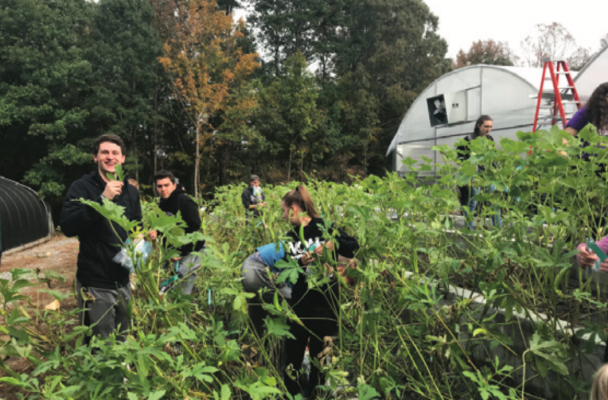Staff and students study genetics of slimy vegetables

By Nicholas Bainbridge// News Editor
Drs. Cindy and Patrick Vigueira, a pair of professors at High Point University, have been working with their class to develop a new strain of Okra, a southern a vegetable characterized by its high levels of nutrients and slime.
The duo has been working on several agricultural projects, achieving some success with their work on blackberry lily. With their most recent endeavor, they have decided to involve their Domestication Syndrome class in the process of creating a new strain.
“The primary role of my job is to teach and interact with students,” said Dr. Cindy Vigueira. “I find that it is highly beneficial to involve students in the research process. It makes science more real and is the best way to teach the subject.”
Throughout the Fall 2018 semester, the Vigueiras and the students have been analyzing okra to breed a version of the crop that produces less of the iconic slime that drives away many potential consumers and keeps people from enjoying the unique southern food.
The Vigueiras explained that while Okra is nutritious, its high levels of mucilage, or slime production, makes it unpalatable for some who have not grown up with the crop.
“We are a southern school, and Okra is a southern crop,” said Dr. Patrick Vigueira. “Given that we have a lot of students from outside the state, we wanted to give them the opportunity to experience it, but the mucilage content keeps a lot of people from enjoying Okra.”
In the Vigueira’s class, students have been collecting samples of a recent Okra crop and analyzing them to find mutations while developing DNA primers to accelerate the process. Furthermore, they have been making use of the machinery in HPU’s chemistry labs to analyze the effects of these primers on Okra DNA.
The professors expressed approval at the work their students have done so far and said that the students have been of great help in their work.
“I have been very much impressed with the level of productivity,” said Patrick aVigueira. “Science is a very slow process, but when you have a lot of hands working simultaneously, it speeds up the process substantially.”
The main issue they reported was not student error but a false sense of incompetence amongst their students who believe that science is not for them. As a part of the general Honors curriculum at HPU, the majority of the class are not well versed in STEM research and have felt intimidated.
“The primary challenge so far is self-doubt as students see science as beyond their capabilities,” said Patrick Vigueira. “We have had to spend as much time reassuring students as teaching them new methods.”
The core philosophy the duo has been implementing to dispel the doubts of their students is to teach them about the importance of a growth mindset, the idea that people can always improve their capabilities.
“We’ve been trying to break down their fixed mindset and make them realize that their past experiences in science do not limit them and that they should adhere to a growth mindset,” said Dr. Cindy Vigueira.
After the semester has ceased, the professors will continue their Okra research and seek funding from the U. S. Department of Agriculture under the research category of specialty crop development. With this and the rest of the support they have received, they have expressed confidence in their ability to succeed.
The Vigueiras were quick to attribute the success of their work so far to the support they have received from HPU.
“We are appreciative of the opportunities that the university has provided us, both with the financial support and the agricultural aid from the Mariana H. Qubein Botanical Gardens, especially the curator of gardens Jon Roethling,” said Patrick Vigueira.
The Vigueiras are working on several other projects and are developing multiple plants for horticultural purposes.
Students harvest Okra.Photo By Nicholas Bainbridge